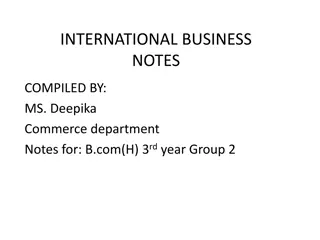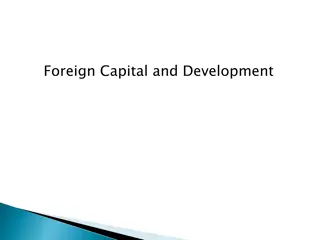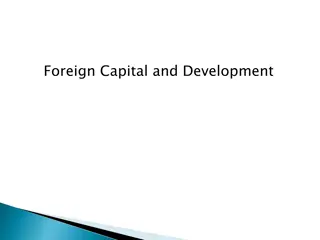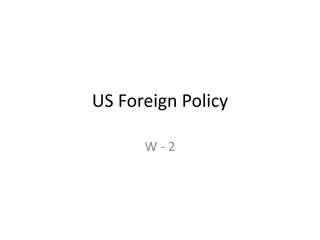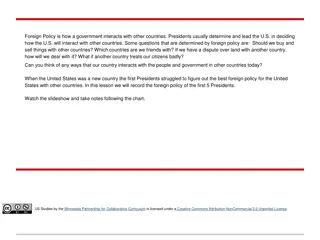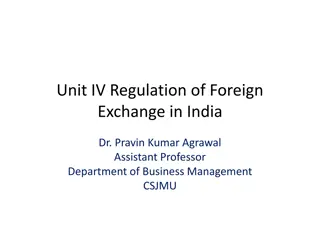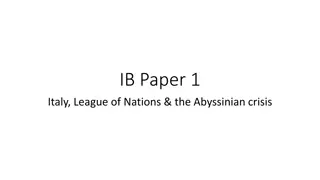Italian Foreign Policy in the Abyssinian War and its Aftermath
The Abyssinian War and its aftermath in the Middle East are explored through the lens of Italian foreign policy. The Mussolini-Laval Agreements of January 1935, the Anti-British line in the summer of 1935, and the Anglo-Italian rivalry all played significant roles in shaping events. Britain sought stability and compromise, while Italy aimed for conquest. The delicate balance of power and interests in the region impacted diplomatic relations and territorial claims between the nations involved.
Download Presentation

Please find below an Image/Link to download the presentation.
The content on the website is provided AS IS for your information and personal use only. It may not be sold, licensed, or shared on other websites without obtaining consent from the author.If you encounter any issues during the download, it is possible that the publisher has removed the file from their server.
You are allowed to download the files provided on this website for personal or commercial use, subject to the condition that they are used lawfully. All files are the property of their respective owners.
The content on the website is provided AS IS for your information and personal use only. It may not be sold, licensed, or shared on other websites without obtaining consent from the author.
E N D
Presentation Transcript
Prof. B. Pierri History of Italian Foreign Policy The Abyssinian War and the Middle Eastern aftermath March 17th, 2015
Mussolini-Laval Agreements Jan 1935 Jan 1935: treaty that defined disputed parts of French Somaliland as part of Eritrea, redefined the official status of Italians in French-held Tunisia, and essentially gave the Italians a free hand in dealing with Ethiopia Italy was also to receive the Aozuzu Strip, which was to be moved from French- ruled Chad to Libya In exchange for all these concessions, France hoped for Italian support against German aggression
Anti-British line: summer 1935 Native Policy: Britain to protect native peoples London had to control Lake Tsana waters and keep stability among Ethiopian populations and those leaving in border and grazing areas Another colonial war as a threat to stability of area French had only economic interests in Horn (Djibuti-Addis Abeba railway) Italy had to reach agreement with London on grazing and watering rights of Somalis in Ethiopia
Anglo-Italian rivarly Mussolini wanted Britain to give him free hand in conquest of Ethiopia London wanted Italy to reach compromise with Ethopia through diplomacy Maffey Report Question examined only from British point of view London had interests in Ogaden and Harar on grazing and watering rights, while in North-West Late Tsana waters were pivotal for Sudan and Egypt In case of Italian conquest of all Ethiopia, Sudan would have had more than 3,000 km of border with European power claming economic expansion. In case of war against Italy, colonial blockade in Horn would have been a serious threat to British strategic positions in Red Sea and Gulf of Aden It was always possibile for Fascist regime to seek more glory in the North Independent Ethiopia was better for Britain. However, since the risk of war against Italy was very unlikely, and since a frontier with European power was always safer than one with unstable country, for Britain it did not make any difference if Ethiopia was independent or not A) B) C) D) E) F)
British Interests in Suez and Red Sea Suez Canal as a swinging door of Empire Shortcut to reach colonies in Indian Subcontinent and Australia Divergence with France, which put pressure on Addis Abeba to give as many concessions to Italy as possibile
Italian Propaganda in Middle East Abyssinia and slavery Abyssians as enemies of Egypt and Islam Objective was rallying Arabs and Muslims Blue Shirts Movement in Egypt got information on history of fascism Luce newreels on agricultural developments in Libya Radio Bari denounced British imperialism which subjugated about of Muslim world Propaganda on Christian-Muslim rivalry in Ethiopia Report on Muslims in Ethiopia 1) Moslems lacked leadership, had low education and low level of religious awareness 2) Moslems excluded from public offices due to Christian fanaticism and low education
Hoare-Laval Pact Anglo-French proposal approved Dec 8 A)Recommendation to Emperor to accept some territorial changes in favour of Italy B)Easter Tigray, Dankalia, Ogaden C)French monopoly on railways D)Italian Economic sphere of influence in South (with military presence?) E)Oil embargo against Italy to discuss in League of Nations. Laval sure that Mussolini could wage war on this, thus he suggested further attempts of reconciliation F)In case of war, Laval did not want to accept precise duties towards Britain
King Edward VIII Secret meeting with Italian ambassador King contrary to British Govt policies, while admiring Italian colonial enterprise War Britain-Italy could provoke deflagration of Europe The conquest of Abyssinia cured the continent from [ ] a secular centre of infection [ ] and make it possible an effective cooperation in that big part of Africa between the colonising mission of Italy and Britain . He committed himself personally to avoid any war against Italy, with whom cooperation in Mediterranean was pivotal [1] Cfr. L ambasciatore a Londra, Grandi, al Capo del Governo e Ministro degli Esteri, Mussolini, 29 aprile 1936, L.P., in DDI, Ottava Serie, Vol. III, pp. 843-856. [2] Cfr. L ambasciatore a Londra, Grandi, al Capo del Governo e Ministro degli Esteri, Mussolini, 1 maggio 1936, L.P., in DDI, Ottava Serie, Vol. III, pp. 867-870.
Britain and Egypt Ethiopian crisis as catalyst for Egyptian independence Lampson (British commissioner) said that only positive outcome of Italian invasion of Abyssinia was that population in Egypt would accept some form of British control Mussolini denied that Italy posed a threat to Egypt Unilateral formal independence to Egypt Feb 28 1922 Aug 1936 Treaty of Alliance Britain-Egypt Britain allowed to build military bases in Suez Canal area and station 10,000 soldiers and 400 Royal Air Force men Egypt had to build infrastructures for communications In case of war, Egypt to put at British disposal all necessary infrastructures for Canal and country defence A) B) C)
Italians in Egypt Mussolini wanted to show that all Italians, both at home and abroad, supported conquest of Ethiopia Disciplined but enthusiastic manifestations while Italian ships went through Suez Canal Contacts between Italian Legation and Young Egypt leaders Italy to back full Egyptian independence in case of Egyptian support to Italian interests in Ethiopia
Saudi Reactions Officially neutral No sanctions implemented against Italy: not a member of League of Nations As warden of holy places, Saudi Arabia obliged to keep friendly relations with all countries with Muslim subjects Status of Italy as Red Sea power was cause of concern for Ibn Saud Britain could not grant military support in case of Italian attack against S. Arabia (Rome Agreement 1927) Ibn Saud suspicious of Italy: treaty of alliance with Iraq: mutual defence in case of attack by third party
Yemen Imam Yahya (ruler of Yemen) approached by Ethiopians in Spring 1935 to sign treaty of friendship Treaty with Ethiopia was to have no effects on good relations with Italy, since it only dealt with trade Mussolini: any occupation of Yemenite territory would provoke a conflict with UK. Better to improve relations with Yemen Yemen neutral during war, banning arms both to Italy and Ethiopia Limited assistance to Italian war effort: civilians labourers sent to Eritrea Britain could not grant military support in case of Italian attack against Yemen (Rome Agreement 1927)
Palestine Italy tried to persuade Zionist leaders to influence British not to include Palestine in sanctions Jewish opposition to war might have induced Mussolini to revise attitude towards Jews No pressure on Palestinian Arabs, probably not able to influence Britain However, Radio Bari broadcast propaganda to arouse indignation towards Britain, as sanctions harmed Palestine s economy Ciano appointed Minister of Foreign Affairs June 1936: connections with Zionism gradually severed. Relations with Palestinian Arab leaders began to flourish Mufti of Jerusalem appealed to Italian Consul General in Jerusalem to supply arms and money with which he could start revolt against British
Zionist reactions Mainstream Zionism generally critical towards Italy Weizmann had no hopes of obtaining anything from Italy and openly sided with British Revisionist Zionists more sympathetic towards Italy: press articles stating that Negus was a tyrant and that victory of Italy was better for white race. Moreover, Jews of Palestine would benefit from Italian threat to British in Suez Canal area - mandatory power could be induced to give Jews a state
Syria, Lebanon, Iraq Syrian and Lebanese public opinion more open towards Italy Italian threat quite far away Benefits from good Italo-French relations Opposition to war led by Orthodox clergy, anti- colonialist circles and ultra-religious Muslims Iraq took a strong stand against Italy and sanctions were implemented AGIP in 1935 had 52% of shares in Mosul Oil Fields, multinational company with substantial concessions in Northern Iraq In 1936 Italian govt no longer able to maintain financial support of AGIP committments in Iraq all shares sold (expansion in Africa more important than independent access to Iraqi oil) 1) 2) 3)
Red Line Agreement Signed by partners in the Turkish Petroleum Company (TPC) on July 31, 1928 The aim of the agreement was to bind all partners to a "self-denial clause" that prohibited any of its shareholders from independently seeking oil interests in the ex-Ottoman territory








